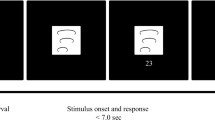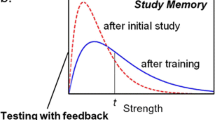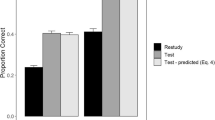Abstract
Two different methods of practice are available in the learning of simple information, test practice or study practice. Of these two methods of learning, research has generally shown that test practice is superior to study practice. However, this research has not considered the testing advantage with respect to the fact that test learning is uncertain (i.e. if recall fails, nothing appears to be learned) or with respect to the fact that study learning depends greatly on the duration of the study event. The following work clarifies these issues by presenting an integrated computational model of the relative costs and benefits of testing compared to study presentation [based on the ACT-R theory of declarative memory; Anderson, J.R. & Schooler, L.J. (1991). Psychological Science 2: 396–408; Pavlik Jr., P.I.. & Anderson, J.R. (2005). Cognitive Science 29: 559–586]. This model was applied to determine how test and study practice can be optimally employed to improve learning and provides a framework for understanding the effects of mnemonic strategies in simple memory tasks.
Similar content being viewed by others
References
Allen G.A., Mahler W.A., Estes W.K. (1969) Effects of recall tests on long-term retention of paired associates. Journal of Verbal Learning and Verbal Behavior 8:463–470
Anderson J.R., Lebiere C. (1998) The Atomic Components of Thought. Lawrence Erlbaum Associates Publishers, Mahwah, NJ, US
Anderson J.R., Schooler L.J. (1991). Reflections of the environment in memory. Psychological Science 2:396–408
Atkinson R.C. (1975). Mnemotechnics in 2nd-language learning. American Psychologist 30:821–828
Atkinson R.C., Raugh M.R. (1975) An application of the mnemonic keyword method to the acquisition of Russian vocabulary. Journal of Experimental Psychology: Human Learning and Memory 104:126–133
Baddeley A., Lewis V., Eldridge M., Thomson N. (1984) Attention and retrieval from long-term memory. Journal of Experimental Psychology: General 113:518–540
Bahrick H.P. (1979) Maintenance of knowledge: Questions about memory we forgot to ask. Journal of Experimental Psychology: General 108:296–308
Bentin S., Moscovitch M., Nirhod O. (1998) Levels of processing and selective attention effects on encoding in memory. Acta Psychologica 98:311–341
Bjork R.A., Allen T.W. (1970) The spacing effect: Consolidation or differential encoding. Journal of Verbal Learning & Verbal Behavior 9:567–572
Carrier M., Pashler H. (1992) The influence of retrieval on retention. Memory & Cognition 20:633–642
Coltheart M. (1981) The MRC psycholinguistic database. Quarterly Journal of Experimental Psychology: Human Experimental Psychology 33:497–505.
Cooper E.H., Pantle A.J. (1967). The total-time hypothesis in verbal learning. Psychological Bulletin 68(4):221–234
Crutcher R.J., Ericsson K.A. (2000). The role of mediators in memory retrieval as a function of practice: Controlled mediation to direct access. Journal of Experimental Psychology: Learning, Memory, and Cognition 26:1297–1317
Cull W.L. (2000) Untangling the benefits of multiple study opportunities and repeated testing for cued recall. Applied Cognitive Psychology 14:215–235
Cull W.L., Shaughnessy J.J., Zechmeister E.B. (1996) Expanding our understanding of the expanding pattern of retrieval mnemonic: Toward confidence in applicability. Journal of Experimental Psychology: Applied 2:365–378.
Dempster F.N. (1989). Spacing effects and their implications for theory and practice. Educational Psychology Review 1:309–330
Fishman, E.J., Keller, L. & Atkinson, R.C. (1969). Massed versus distributed practice in computerized spelling drills. In R. Atkinson & H.A. Wilson, eds, Computer assisted instruction. New York: Academic Press.
Glenberg A.M. (1976) Monotonic and nonmonotonic lag effects in paired-associate and recognition memory paradigms. Journal of Verbal Learning and Verbal Behavior 15:1–16
Hogan R.M., Kintsch W. (1971) Differential effects of study and test trials on long-term recognition and recall. Journal of Verbal Learning and Verbal Behavior 10:562–567
Kane M.J., Engle R.W. (2000). Working-memory capacity, proactive interference, and divided attention: Limits on long-term memory retrieval. Journal of Experimental Psychology: Learning, Memory, and Cognition 26:336–358.
Landauer T.K., Bjork R.A. (1978) Optimum rehearsal patterns and name learning. In: Gruneberg M.M., Morris P.E., Sykes R.N. (eds) Practical aspects of memory. Academic Press, New York, pp. 625–632
Martin E. (1968) Stimulus meaningfulness and paired-associate transfer: An encoding variability hypothesis. Psychological Review 75:421–441
McBride D.M., Dosher B.A. (1997) A comparison of forgetting in an implicit and explicit memory task. Journal of Experimental Psychology: General 126:371–392
Metcalfe J., Kornell N. (2003) The dynamics of learning and allocation of study time to a region of proximal learning. Journal of Experimental Psychology: General 132:530–542
Pashler H., Cepeda N., Wixted J., Rohrer D. (2005) When does feedback facilitate learning of words? Journal of Experimental Psychology: Learning, Memory, and Cognition 31:3–8
Pavlik Jr., P.I. (in press). Timing is an order: Modeling order effects in the learning of information. In F.E. Ritter, J. Nerb, T. O’Shea & E. Lehtinen, eds, In order to learn: how ordering effects in machine learning illuminate human learning and vice versa. New York, NY: Oxford University Press.
Pavlik Jr., P.I. & Anderson, J.R. (2005). Practice and forgetting effects on vocabulary memory: An activation-based model of the spacing effect. Cognitive Science 29: 559–586.
Peterson L.R., Wampler R., Kirkpatrick M., Saltzman D. (1963) Effect of spacing of presentations on retention of paired-associates over short intervals. Journal of Experimental Psychology 66:206–209
Pimsleur P. (1967) A memory schedule. Modern Language Journal 51:73–75
Raiijmakers J.W. (2005) [Practice and forgetting effects on vocabulary memory: An activation-based model of the spacing effect.] Cognitive Science 29:559–586
Runquist W. (1983). Some effects of remembering on forgetting. Memory and Cognition 11:641–650
Slamecka N.J., Katsaiti L.T. (1988). Normal forgetting of verbal lists as a function of prior testing. Journal of Experimental Psychology: Learning, Memory, and Cognition 14:716–727
Thompson C.P., Wenger S.K., Bartling C.A. (1978). How recall facilitates subsequent recall: A reappraisal. Journal of Experimental Psychology: Human Learning and Memory 4:210–221
Underwood B.J. (1970). A breakdown of the total-time law in free-recall learning. Journal of Verbal Learning & Verbal Behavior 9:573–580
Wang A.Y., Thomas M.H. (1995). Effect of keywords on long-long retention: Help or hindrance? Journal of Educational Psychology 87:468–475
Wang A.Y., Thomas M.H. (1999). In defense of keyword experiments: A reply to Gruneberg’s commentary. Applied Cognitive Psychology 13:283–287
Acknowledgments
This research was supported by NIH training grant MH 62011, NIMH R01 MH 68234 and by Ronald Zdrojkowski.
Author information
Authors and Affiliations
Corresponding author
Rights and permissions
About this article
Cite this article
Pavlik, P.I. Understanding and applying the dynamics of test practice and study practice. Instr Sci 35, 407–441 (2007). https://doi.org/10.1007/s11251-006-9013-2
Received:
Accepted:
Published:
Issue Date:
DOI: https://doi.org/10.1007/s11251-006-9013-2




